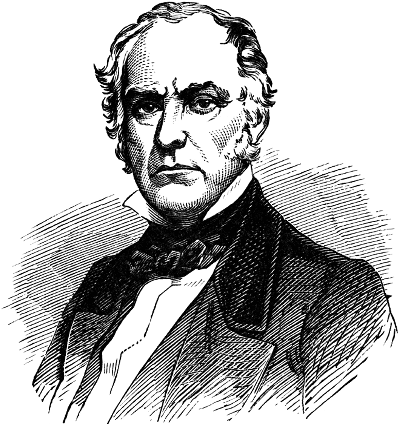Only sitting U.S. Senator killed in battle was from Oregon … sort of
Edward Dickinson “Ned” Baker was a close personal friend of President Lincoln and a formidable public speaker; had he not been killed, he might well have become president. Without his influence, Oregon might have sided with the South.

Sen. Edward Dickinson Baker, depicted in a woodcut portrait probably
made around 1860
. (Image from University of South Florida)
By Finn J.D. John — April 10, 2011
Downloadable audio file (MP3)
For the North, October of 1861 was the darkest part of the Civil War. For the Union troops trying desperately to storm up the steep, treeless face of Ball’s Bluff in Virginia one particular day, it was especially so. The river was at their backs, the rebels were in front of them and they were like a main course at an all-you-can-shoot buffet.
Seeing the survivors’ courage beginning to waver, their colonel came up to the front to encourage them — and, his uniform recognized, went down in a fusillade of rebel gunfire.
And that was the end of Senator Edward Dickinson Baker of Oregon, the only sitting U.S. Senator to ever die in battle.
Hardly anyone knows about Baker, but some historians consider him the most important figure in Oregon’s Civil War history. Without him, the entire West Coast might have ended up joining the cause of the South.
And yet Ned Baker wasn’t really an Oregonian at all — or if he was, only just barely.
A close personal friend of Abraham Lincoln
Baker was born in Great Britain, but emigrated to the U.S. when he was 5. His family was Quaker, but as an adult he joined the Disciples of Christ Church; although the Civil War tempted many devout Friends to stray from their commitment to the Sixth Commandment, Baker had a real un-Quakerly taste for military action.
He also had a really unusual gift for public speaking, so it was probably no surprise when he became an attorney. Baker ended up in Springfield, Ill., at the same time another young attorney, Abraham Lincoln, was practicing there. The two became great friends, both committed to the cause of ending slavery.
A California lawyer ...
A few years later, during the Gold Rush years, Baker brought his law practice to San Francisco. Like so many others, he loved the place and didn’t want to leave. But by the end of the 1850s, it was becoming clear that he’d have to; if he ever wanted to be elected to national public office, it wouldn’t be in California. The state was firmly Democratic, and the Democrats at that time were the party of the South.
So Baker accepted the Oregon Republican Party’s invitation to come up north and help them save the new state from the clutches of the soft-on-slavery Democrats — led by Oregon Senator Joseph Lane.
... and then an Oregon politician
Baker set up housekeeping on the campus of Willamette University in Salem. Eight months later, he was elected to the U.S. Senate.
During those eight months, though, Baker was a busy man. He traveled tirelessly around the state giving speeches in support of his friend Lincoln. He must have been pretty good at this. Lane himself was running as vice-president on the Southern Democratic Party ticket, and had blithely assumed that Oregon would follow his leadership — into secession, if it came to that.
But on election day, Oregon went for Lincoln. Lane wasn’t even able to deliver his own state.
As if to add insult to injury, the Oregon state legislature then elected Baker to the U.S. Senate — he became Oregon's junior senator, with Lane as the senior senator. So not only did Lane get handed a stinging defeat by this upstart crow, he then suddenly had to accept him as a Congressional colleague to boot. Lane was so furious he refused to introduce Baker in the Senate, as was the usual protocol.
Oregon secessionist movement fizzles
In his book, historian Elijah Kennedy makes a strong case that Lane’s pique was understandable. His plans had involved delivering the entire West Coast to the South, or possibly having it secede on its own as a “Pacific Republic.” Without Baker’s wildly successful oratory barnstorming tour, Kennedy says, this would have happened. And Kennedy was there at the time, living in California, so his opinion carries some weight.
It’s tempting to wonder what would have happened if Baker had survived the war. By all accounts, the man was one of the best speakers of the century. When he started his barnstorming tour of the state, most of its 52,000-odd residents thought of him as an imported interloper, or what Southerners would a few years later call a “carpetbagger.” By the time he finished giving speeches in Astoria, The Dalles, Roseburg and places in between, they mostly didn't care about that any more. By all accounts, he was amazing — blessed with a freakish ability to remember people’s names, and a natural touch on the podium. He was on the side that won the war. He was one of Lincoln’s closest friends. What might he have gone on to accomplish? Would he have gone on to become Oregon’s first Presidential native son (or, rather, stepson)? It sure seems possible — likely, even.
Baker County named after him
Today, Baker is buried in San Francisco, and there is a statue of him in the Capitol rotunda in Washington, D.C. Like his old nemesis, Joseph Lane, he has an Oregon county named after him (as well as a city). Lane County is on the extreme west side of the state; Baker County is on the extreme east; and there’s a big mountain range between them. Both men would probably have approved.
(Sources: Kennedy, Elijah R. The Contest for California in 1861: How Colonel E.D. Baker Saved the Pacific States to the Union. New York: Houghton Mifflin, 1912; Vandenhoff, Anne. Edward Dickinson Baker. Auburn, Calif.: Pony Express, 1979; Boyd, William C. “Edward Dickinson Baker, Alien Senator,” Oregon Historical Quarterly, vol. 43 no. 2, June 1942.)
TAGS: #NedBaker #KIA #BattleOfBallsBluff #Colonel #Senator #EdwardBaker #UnionArmy #AmericanCivilWar #RepublicanParty #JosephLane #WillametteUniversity #ElijahKennedy #AnneVandenhoff #WilliamBoyd #Slavery #Abolitionist











